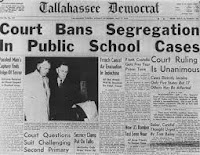Today in class the moot court case of Dred Scott vs. Sandford was called to order. This case explored the issue of Dred Scott, an enslaved African American who wished to free himself from his owner. Dred Scott was born a slave in Virginia, and after his master's passing was sold to a farm owner in Wisconsin. At the time the Wisconsin territory was considered a free slave state, for this reason Dred Scott attempted to free himself from the bonds of slavery.
The court began with a brief description of the case, following this the defendant began to lay the foundation of their argument. One of the most important pieces in this debate is the fact that Dred Scott was being taken to a part of the country where slavery was not allowed. For this reason the defendant felt that Dred Scott should be not only allowed to request his freedom, but be granted it. Along with this argument the defendant also used an argument on the basis of humanity and ethics. They argued slavery as a whole is an evil that should not exist. Although several important arguments were heard, overall their side did not hold up to the law at the time.

In response to these arguments the persecution fired back with several strong points. Dred Scott was a born a slave and therefore did not have the right to even bring his case to trial. The most important aspects of this case were establishing that due to the fact that he was a slave he did not hold any legal rights. Being born a slave he was also not considered a citizen. The result of Dred Scott v. Sanford set forth an important precedent that slaves were not considered citizens and therefore had no rights. The court was faced with the question if Scott's case was even justified to be heard by the court and if moving to a free state entitled a slave freedom. After much deliberation the verdict was that no Scott did not have the right to sue and that moving to a free state did not entail freedom.
Below is a link providing more information on the court case.
Dred Scott v Sanford was a turning point in America's history, as from this point on until slavery was abolished slaves were not considered citizens. The ruling of the case lasted for decades, and impacted slaves across the country.




























